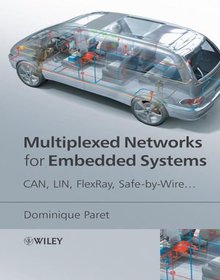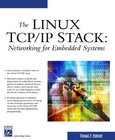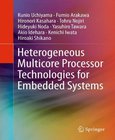Multiplexed Networks for Embedded Systems
CAN, LIN, FlexRay, Safe-by-Wire

Book Details:
| Publisher: | Wiley |
| Series: | Wiley , Embedded |
| Author: | Dominique Paret |
| Edition: | 1 |
| ISBN-10: | 0470034165 |
| ISBN-13: | 9780470034163 |
| Pages: | 434 |
| Published: | Jul 16 2007 |
| Posted: | May 27 2015 |
| Language: | English |
| Book format: | |
| Book size: | 13.27 MB |
Book Description:
Multiplexed networks are essential for the unified, efficient and cost-effective exchange of electronic information within embedded component systems. This is especially important in automotive manufacturing as vehicles become increasingly reliant on robust electronic networks and systems for improved reliability, anti-lock brake systems (ABS), steering, on-board navigation systems, and much more. The latest systems such as X-by-Wire and FlexRay aim to produce faster, fault-tolerant network component interconnects, for state-of-the-art network implementation and safer, more reliable engineering of vehicular systems. This book provides a thorough and comprehensive introduction to automotive multiplexed network buses, covering the technical principles, components, implementation issues and applications. Key features:* Presents a thorough coverage of the controller area network (CAN) protocol, including information on physical layers, conformity problems, hardware and software tools, and application layers.* Gives a detailed description of the new local interconnect network (LIN) bus, setting out its developments, properties, problems and ways to overcome these.* Examines the existing and emerging network buses such as time-triggered CAN (TTCAN), FlexRay and X-by-Wire.* Explores the possibilities for linking the various buses that are discussed, explaining how the Fail-Safe-System basis chip (SBC) and other gateways are designed and constructed.* Analyses wired and wireless internal and external serial links, including Safe-by-Wire plus, I2C, Media Oriented Systems Transport (MOST), remote keyless entry, tyre pressure monitoring systems (TPMS) and Bluetooth. A valuable guide to embedded systems for a range of applications, Multiplexed Networks for Embedded Systems: CAN, LIN, FlexRay, Safe-by-Wire...is essential reading for electronics engineers and researchers developing electronics for the automotive industry. It is also useful for practising aerospace engineers and other practitioners interested in the application of network technologies, and advanced students taking courses on automotive and embedded system design.
Download Link:
Related Books:
Serial Port Complete
COM Ports, USB Virtual COM Ports, and Ports for Embedded Systems
2nd Edition
PC COM ports, USB virtual COM ports, and ports in embedded systems are all addressed in this updated guide to programming, interfacing, and using serial ports. Topics include using .NET's SerialPort class for COM-port communications on PCs; upgrading existing RS-232 designs to USB or wireless networks; and creating serial networks of embedded systems and PCs. Example circuits and code provide a quick start to projects. Installation and maintenance staff will also find tips for ensuring reliable operation and problem tracking....
The Linux TCP/IP Stack
Networking for Embedded Systems
The Linux TCP/IP Stack: Networking for Embedded Systems provides an in-depth guide to implementing and using the Linux TCP/IP stack in embedded systems projects. It begins with a general overview of TCP/IP networking, with background information on applicable networking standards. From there, it details the TCP/IP implementation in Linux 2.6 by following a packet of data as it flows through the stack from the sending system, out the wire, and back through the input side of the stack in the receiving machine. This unique approach gives programmers an "inside" look at the entire process. Throughout the text, topics of particular interest to engineers implementing embedded systems are discussed, such as sockets, network interfaces, application...
Heterogeneous Multicore Processor Technologies for Embedded Systems
To satisfy the higher requirements of digitally converged embedded systems, this book describes heterogeneous multicore technology that uses various kinds of low-power embedded processor cores on a single chip. With this technology, heterogeneous parallelism can be implemented on an SoC, and greater flexibility and superior performance per watt can then be achieved. This book defines the heterogeneous multicore architecture and explains in detail several embedded processor cores including CPU cores and special-purpose processor cores that achieve highly arithmetic-level parallelism. The authors developed three multicore chips (called RP-1, RP-2, and RP-X) according to the defined architecture with the introduced processor cores. The chip implementati...
2007 - 2021 © eBooks-IT.org



